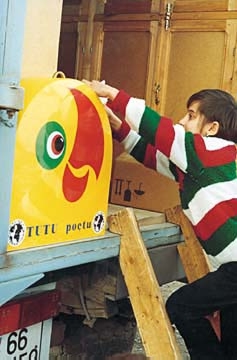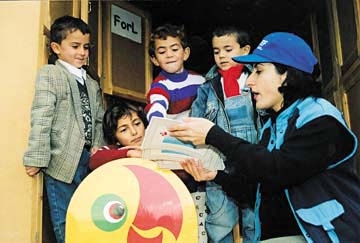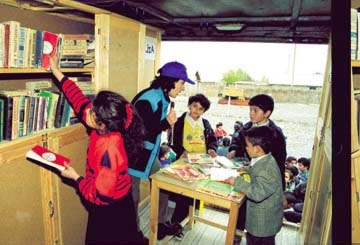|

Spring
2000 (8.1)
Pages
46-49
 |
You Won't Forget
Me, Will You, Tutu?
A Parrot
Connects Refugee Kids to the Outside World
by
Farida Sadikhova
Elgun's Letter to TUTU
More at WEB: TUTUBOOKS.com
  One of Azerbaijan's
greatest problems in transitioning to the new Latin alphabet
has to do with the country's immense refugee population brought
on by the conflict in Nagorno-Karabakh, a region in Western Azerbaijan. One of Azerbaijan's
greatest problems in transitioning to the new Latin alphabet
has to do with the country's immense refugee population brought
on by the conflict in Nagorno-Karabakh, a region in Western Azerbaijan.
When Armenian military forces ransacked and pillaged towns and
villages back in 1992 and 1993, Azerbaijani refugees by the hundreds
of thousands fled for their lives, often on foot. Many gathered
into makeshift camps set up near the sides of roads. Gradually,
humanitarian organizations began providing emergency shelter
in tents. Even today, tens of thousands of refugees still live
in subhuman conditions in mud-brick shelters they built themselves,
in empty boxcars along railway sidings and in what were previously
dormitories and even unoccupied, unfinished buildings.
Photo: Posting a letter to
TUTU, the parrot.
But one of the greatest tragedies of the war is that refugee
children have not had the chance to receive a normal education.
The decision to change alphabets has further exacerbated the
situation.
While many Azerbaijanis are quick to point a finger at the cash-strapped
government for not providing more books, concerned individuals
like Tarlan Gorchu are actually trying to do something to alleviate
the situation. We talked with Tarlan about two main projects
that he directs: publishing colorful children's books in the
new Latin alphabet for young readers, and creating a penpal system
with TUTU, an imaginary parrot, so that young refugee kids can
connect to a world beyond refugee camps and believe in their
future. Though the need is overwhelming, Tarlan and his team
of volunteers have found ways to make an impact. But they need
help.
_____
The Tutu
Mail Project
  Photo: Refugee children running to meet the
Mobile Library that makes its rounds to numerous refugee camps
each week. This educational project is sponsored by the UNHCR
and Relief International. Photo: Refugee children running to meet the
Mobile Library that makes its rounds to numerous refugee camps
each week. This educational project is sponsored by the UNHCR
and Relief International.
Who receives
the most letters in Azerbaijan?
Without a doubt, it's TUTU, a friendly, bright-eyed, lovable
yellow parrot - the brainchild of Tarlan Gorchu and a group of
five volunteers who write to children in refugee camps.
But why Tutu? "Well, he's a bird, not just an ordinary bird.
He's a parrot and that means he likes to talk a lot, laugh a
lot, repeat words a lot. He's colorful, curious and loved by
everybody. Just like kids!" explains Tarlan.
In a sense, writing TUTU is a bit like writing to Santa Claus,
except that TUTU can't give kids the physical things they want
or even need. Rather he tries to give them friendship, hope and
a desire to become educated - which is a far greater gift.
  Whenever schoolchildren
write letters to the imaginary parrot, he personally answers
every single letter (via the assistance of volunteers, some of
whom are actors in the Buta Children's Marionette Theater.) Tarlan's
wife Heyran Badalova also carries much of the administrative
load. Whenever schoolchildren
write letters to the imaginary parrot, he personally answers
every single letter (via the assistance of volunteers, some of
whom are actors in the Buta Children's Marionette Theater.) Tarlan's
wife Heyran Badalova also carries much of the administrative
load.
Photo: Distributing books
from the Mobile Library.
"You
have to be very careful and attentive to the children's letters.
You must put your heart and soul into each letter. We always
try to calm them down, to give them hope," Tarlan explains.
Kids write in Azeri Latin as they don't know Cyrillic at all.
Sometimes when they see books in Azeri Cyrillic, they think it's
in Russian. The TUTU team also writes back in Azeri Latin.
As of April 2000, TUTU had received more than 1,150 letters from
700 different refugee kids since the project began in mid-November
1999.
  For many refugee kids,
it's a new experience to receive mail, as letters from TUTU are
the only ones they've ever received in their entire lives. This
simple gesture transports kids beyond the limited world of their
refugee campsespecially for the kids who were born in the
camps and have no concept of life in the outside world. For many refugee kids,
it's a new experience to receive mail, as letters from TUTU are
the only ones they've ever received in their entire lives. This
simple gesture transports kids beyond the limited world of their
refugee campsespecially for the kids who were born in the
camps and have no concept of life in the outside world.
Photo:
Choosing
books, many of which are published by the TUTU Group.
Some haven't even seen the towns and villages or the picturesque
regions that their families fled from. Some have little idea
of the trauma that their older brothers and sisters, parents
and neighbors have lived through this past decade.
The TUTU letter project began with initial funding from Unocal
for a few computers, office supplies, stationery and envelopes.
TUTU sends personalized typed letters back to the children in
envelopes printed with the parrot's picture along with several
sheets of yellow paper so they can write TUTU back again. The
bright paper and envelopes provide great incentive for the children
to use their best handwriting and to be neat.
Special
Delivery
Currently, TUTU corresponds with children in seven refugee camps
in the central regions of Azerbaijan: Yevlakh, Barda, Oghuz,
Aghjabadi, Aghdam, Shaki and Tatar. Tarlan estimates that between
80-90 percent of the school children in these camps are writing
to TUTU. They share with TUTU things that they often don't even
share with members of their families. They often write TUTU their
secrets.
In each camp a bright yellow postbox has been set up so that
kids can drop in their notes. They're then picked up by a Mobile
Library sponsored by the UNHCR and Relief International, which
makes its rounds through the camp every week. Once the letters
are delivered to Baku, TUTU volunteers busy themselves answering
the letters to be delivered when the mobile library returns to
the location the following week.
Like most children, refugee kids like to ask a lot of questions:
"When will I be able to return home? When will I get to
go to a normal school? I'd like to write to a girl pen pal with
black hair and black eyes - can you help me? Could you send me
a TV set?" One curious seventh-grade girl named Ragsana
asked, "What was the last planet to be discovered?"
It sent TUTU scrambling to discover that the answer was Pegastro,
which had been discovered in 1995.
"We don't want the kids to feel trapped in their camps,"
says Tarlan. "We want them to feel like they're personally
communicating with the outside world. We want them to realize
that someone actually believes in their future - that they haven't
been forgotten."
Kids are thrilled when they get letters back from TUTU. It's
an important link to life beyond the camps, many of which barely
have one central telephone to serve thousands of people, and
in many cases no access to governmental mail service at all.
Once, a first grader's letter was somehow misplaced on its way
to the TUTU office. When the other children received letters
back from TUTU the following week, the child was crushed.
Eventually the letter was found and TUTU wrote back to calm the
boy: "Sorry, but I received your letter late. I was traveling
around in several countries, and your letter kept following me,
trying to catch up with me. I finally received your letter in
France. I don't know when you'll receive my letter but don't
worry, I've received yours." The child was so happy and
went around telling everybody that his letter had found TUTU
in France. It built up a lot of confidence and hope among the
kids in the camp.
TUTU sometimes sends toys or books to encourage the kids to write,
especially during holidays such as New Year's on January 1st
and at Noruz (Spring Holiday) on March 21st. Toys are collected
from kids at schools in Baku and distributed to the refugee children.
"People try to help out with food and clothing for the refugees,
but they often forget that the kids have no toys," says
Tarlan.
In April, a contest is being held to see who can write the funniest
or most interesting story to TUTU. Every child who writes will
receive a small present. The top ten winners will receive a full
set of TUTU books and magazines.
Books
for Refugees
The TUTU (Parrot) Children's Cultural Center was founded three
years ago in 1996. It is a non-governmental, non-political, non-religious,
non-profit organization. It brings together concerned intellectuals
- artists, actors, film directors, psychologists, journalists,
philosophers, philologists and musicians - who are all committed
to serving kids.
"Five to six years ago, we were faced with the problem of
not having books for children in Latin," says Tarlan. "We
adopted a new alphabet, but we didn't have any books in this
script. The need was especially critical in refugee camps. For
the kids who have grown up only studying in Azeri Latin, there
is no information source except for the books they study at school.
But there are only a few textbooks - nothing else - and sometimes
a single text has to be shared among dozens of children. We realized
how critical the problem with Latin books was and decided to
start a separate organization to deal with this problem."
In the past three years, TUTU has published 35 books, in total
about 300,000 copies. The books are distributed to refugee kids
and children from poor families. One of TUTU's first titles was
"Fairy Tales of the World's Peoples," a series of 16
books that contains German, Chinese, Eskimo, Swedish, Indian,
Scottish, French, American, Azerbaijani and other fairy tales.
Six of the volumes have been recorded on audiocassette, narrated
by the famous Azerbaijani actor Rasim Balayev. The remainder
of the series will be recorded soon.
"Fairy Tales of the National Minorities of Azerbaijan"
is a similar book series that features bilingual stories native
to Azerbaijan, from Talish, Kurdish, Lesgin, Jewish and other
traditions. This project is supported by the U.S. Embassy and
international organizations such as the Norwegian Refugee Council,
ISAR (U.S.) and Soros. The British and Norwegian Embassies have
also been involved with some of the TUTU book projects, as has
Oxfam and Save the Children humanitarian organization.
TUTU's latest book, "Nature, Colors and Fairy Tales",
40 pages, just came off the press. It's a book related to the
colors of nature - fauna and flora.
Tarlan insists that every book published by TUTU is of highest
quality. From the design to the text to the illustrations, every
aspect is handled by talented writers and artists. To make sure
the books are attractive to kids, Tarlan shows them to his two
sons: Ujal, 4, and Basat, 2. "They may be too young to read,"
says Tarlan, "but I always take them TUTU magazines and
books so that they can see the colorful illustrations. Observing
them as they page through the books gives me good idea of what
other kids are likely to be attracted to."
The Larger
Picture
TUTU's book publishing division has made considerable progress,
but it can only do so much on its own. "We've managed to
publish 35 children's soft cover books in three years,"
says Tarlan, "but this is nothing compared to the need that
is out there. Tens of thousands of different books should be
published in Azerbaijan every year."
Tarlan accepts the fact that the Azerbaijani government does
not have much money for book publishing. There are some state
publishing organizations in Azerbaijan, but they have published
only a few books. With this in mind, he says, the government
should pay attention to the problem as well as help and encourage
non-profit organizations as much as possible.
"Kids are our future," Tarlan says. "One generation
has already been educated in Azeri Latin, but they are like 'cripples'
because they have only had school textbooks to read. It may be
too late to give them a proper education. Thousands of kids are
uneducated. Now another generation is coming. And yet our government
doesn't treat this as a problem. I think it's a tragedy.
"We Azerbaijanis must take care of our refugees, even more
than foreign companies and foreign humanitarian organizations.
This problem must tug more on our heartstrings. Maybe we don't
have much money, but we're the ones who have to come up with
creative ideas and solutions to help them."
Tarlan Gorchu
was
interviewed by Farida Sadikhova. To write to TUTU or to
find out how you can help them out: Tel: (99-412) 92-23-47; Mobile:
(855) 94-32-87 (Hikmat) and (855) 90-37-87 (Tarlan); Fax: (99-412)
90-65-16; <huseynovha@aznet.org>; Web site: http://www.tutubooks.com
From Azerbaijan
International
(8.1) Spring 2000.
© Azerbaijan International 2000. All rights reserved.
Back to Index
AI 8.1 (Spring 2000)
AI Home |
Magazine
Choice
| Topics
| Store
| Contact
us
|





